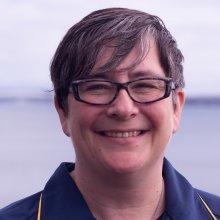
Liz Sutton
Tell us about your work/research. What kinds of things do you do?
As manager of outreach, I have developed a water science program that regularly explores Milwaukee’s rivers, Lake Michigan, and the ocean coasts. I serve as a liaison between the scientific researchers at the School of Freshwater Sciences and the Great Lakes communities that the School serves, communicating scientific findings and increasing water science literacy. This involves research focused tours and presentations to community groups, offering K-12th grade hands-on classroom activities, hosting the Wisconsin Regional Remotely Operated Vehicle (ROV) Competition through the Marine Advanced Technology Education (MATE) International Competition, hosting the Lake Sturgeon Bowl a regional competition of the National Ocean Sciences Bowl, leading professional development opportunities for teachers, connecting scientists to their research stakeholders, and developing the UWM Water Ambassador program which is a science communication and outreach training program for the graduate students at the School of Freshwater Sciences.
What sparked your initial interest in your career?
I grew up on a farm in central Wisconsin. When I wasn’t helping with the farm work, I spent my time playing in the spring-fed stream, making forts in the forest, and fishing in the local river. An appreciation for our natural resources was integral to my childhood. As early as elementary school I began tutoring my fellow students and found that teaching people new things was exciting and came naturally to me. I realized that I could bring the two together and I got a degree in environmental education.
Who influenced you or encouraged you the most?
Whenever I am asked about the reason I do my work I think back to Talia. Talia was an eighth-grade student who participated in my Water Field Adventure summer camp. When her mother initially contacted me to join the class she had three questions: were scholarships available, did Talia need to know how to swim, and would the students be going on a boat on the ocean. Talia’s mother was talking about Lake Michigan. Talia did join the camp and during her time she collected water quality samples in a river, drove a vessel on Lake Michigan, and snorkeled in an inland lake. She went from being afraid of the water to pretending to be a mermaid, all in a week!
What element of your work/study do you think is the most fascinating?
The most fascinating aspect of my work is sharing the work of our research scientists with the community. Every day I get the chance to learn something new about water and the Great Lakes from the scientists at our School which I get to share with the community, helping them understand our research, connecting them to their water resources and making water science meaningful to their daily lives.
What other jobs led you to your current career?
My career has always been in education from being a naturalist at a residential summer camp to teaching in a formal classroom to working with educational non-profits. One of the first jobs I had that really allowed me to expand my work in environmental education was as the education coordinator at a local science museum which housed a set of aquariums and a sailing vessel. It presented me with opportunities to use engineering and technology to connect children to the water. Ten years ago I started working with the University of Wisconsin in Milwaukee as the assistant director of their College for Kids summer program. It was a new position in the organization, I was free to make it my own and determine the projects I wanted to coordinate. Those projects started with creating a college awareness curriculum then moved quickly into setting up STEM programs for local schools. Finally, I took over some of the water education programs from a retiring faculty person. These programs connected me to the School of Freshwater Sciences which I moved to three years ago to start their formal outreach program.
What are your degrees and certifications?
Bachelor of Science in Elementary Education -- University of Wisconsin-Stevens Point 1999
What are your hobbies?
I enjoy reading, playing guitar, and camping with my family. There are few things better than a good campfire and a moonlit hike searching for frogs.
What advice would you give someone who wants to have a career like yours?
My first piece of advice for anyone who would like to study science is to explore. Having personal experiences with the world around you connects you to science in a way that you can’t get through being indoors. That being said, my main piece of advice is to know yourself. I have worked in many wonderful organizations that were doing great work, but my position wasn’t a good fit. It’s not just important to figure out what you are passionate about; you also need to know what type of work you enjoy doing day after day. This is really hard advice for someone just starting out who needs to pay the bills, which we all do for a while in the beginning. But you should never be afraid to reach for a new opportunity if it will be the right fit for you and what you want in your life.
How did you get involved with the Nautilus Exploration Program? How did you get on the ship?
As a regional coordinator for the National Ocean Sciences Bowl, I receive information about a lot of great opportunities to get involved in ocean education. The Science Communications Fellowship program came across my desk and I jumped at the chance to get involved.
Expeditions
Liz participated in the following Ocean Exploration Trust expeditions:
